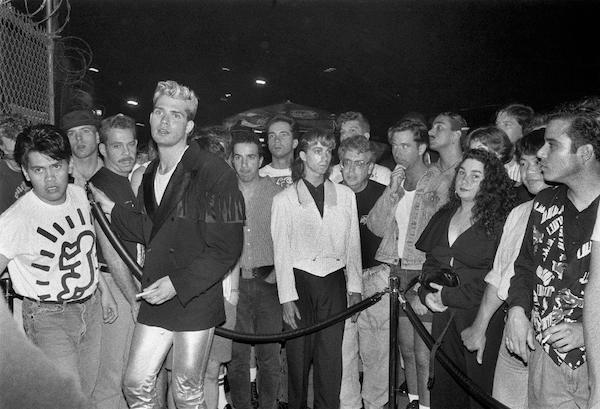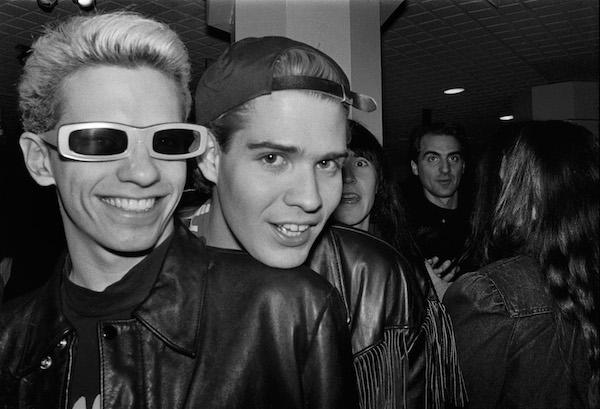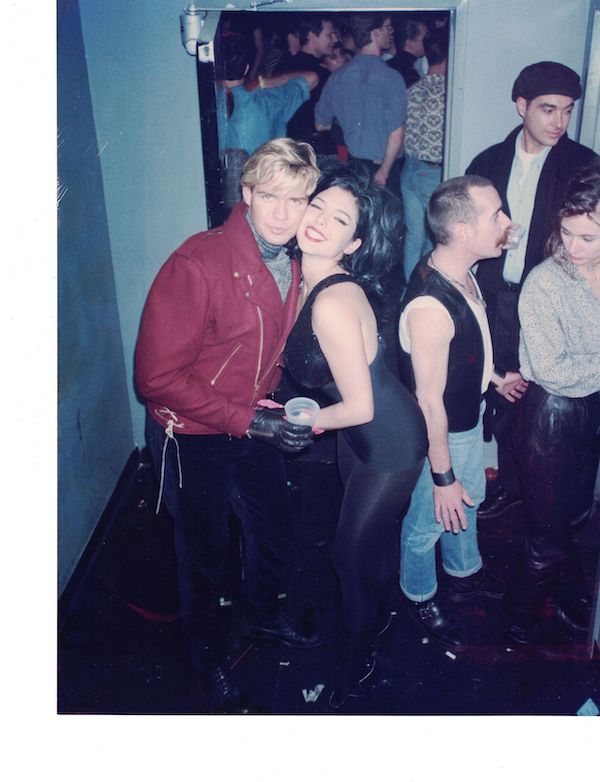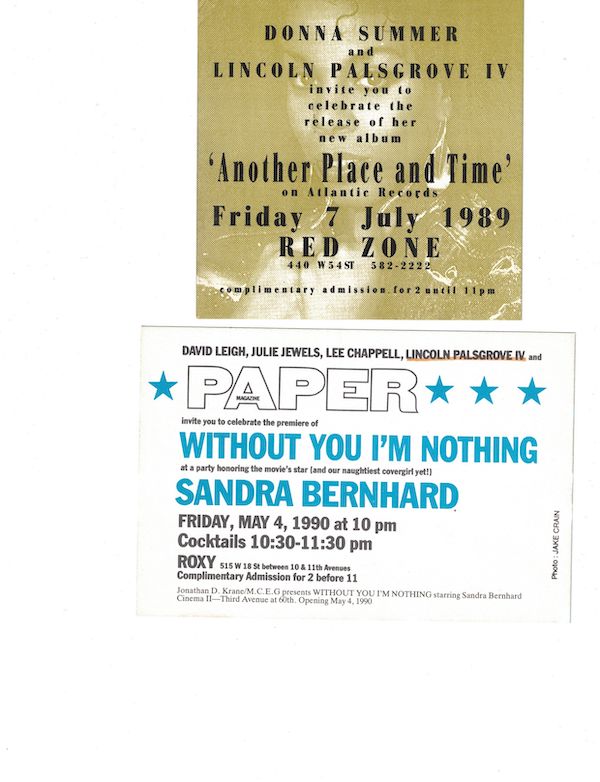
BY MICHAEL MUSTO | A suave door presence, Lincoln Palsgrove IV was a welcome sight outside any number of clubs back in “the glory days,” when the fabbies were begging for entry (preferably free, of course). I talked to the NYC-born-and-raised Lincoln about all he saw and did and was amazed that he has such glorious memories, considering the challenges that faced clipboard-wielding power brokers when clubs were overrun with “celebutantes” and wannabes. Lincoln still lives in NYC, he’s had a partner for over eight years, and while he once worked forSesame Street—he went from club kids to just plain kids, I guess—he later pursued a different path and is now a successful developer.
Hi, Lincoln. Did you come from an upper crusty family?
No, just a crusty family.
Your name always made me think of the millionare on Gilligan´s Island.
That’s who I aspired to date [laughs]. No, my family was very middle of the road, but I had a nice upbringing. I graduated from NYU and started going to clubs while I was in high school. I felt like I was some weird hybrid.
Were you doing your school work?
Yeah. I always thought, “What do I want to be when I grow up?”—looking for a greater meaning in society and the world. As with many others, I felt I found it in the clubs more than I did in going to school. So my school work was probably mediocre—until I was a sophomore at NYU and I started finding stuff I liked, like film production and marketing and p.r.
You were quite young at clubs.
My first job, working at the World, I was 17. I think [manager] Steve Lewis did know that because he said, “You can be doorman to the Crystal Room and then, when you turn 18, you can help James St. James at the door out front.”
Why did you want to be a doorman instead of running around inside the clubs and having fun?
I felt like I got to have conversations with people in a different way. Once you’re inside, all hell breaks loose and you couldn’t hear anyone or see what they looked like. I liked the whole theater of getting in and making an entrance. Once you’re inside, that’s already done. People peacock their way through the front door, and it’s great fun. I worked at 28 clubs. I got to do it at so many different places!


Did people try to manipulate you so they´d get in?
Yeah, for the most part. By time the late ‘80s were in full swing, the idea of standing and waiting to get in was more acceptable. The whole backlash to Studio 54 had subsided. In the ‘90s, it evolved into the idea of a queue. To me, it was a dagger in the heart. That happened on the largest scale at Roxy when it went from [promoters] David Leigh and Lee Chappell to John Blair. “Line up, show your card.” But the World was a crowd, not a line. The same at Red Zone. I went from the World in ‘87 to Red Zone in ’89 to Mars in ‘91 and some miscellaneous shit in between, and then with Roxy—under David and Lee—I felt the stars aligned in my mind. It was a good moment in the city, the music, and a big space.
How did you handle the guest lists?
The lists were such a mess because people would be running out to you, five minutes before opening, with pages written on toilet paper. I’d say, “I think I’ll have to wing it tonight because I can’t read that.” But you knew who the promoter’s friends were. If it was Rock N Roll Fag Bar, it was Dean Johnson’s friends you let in.
Did people pull that old, “Do you know who I am?” routine?
Yeah. The biggest horror show I can remember was some guy at the World who was literally thrown out. He then disappeared around the corner, got in a van and came around the corner almost 45 miles per hour, headed right into the door. A security guy yanked me and pulled me inside the doors for safety. The whole “Don’t you know who I am?” thing, at the end of the day, if someone was saying that to me, they probably don’t deserve to be inside.
Did people offer drugs to get in?
They’d offer all kinds of things. Cash, sex, shoes, a car.
How did you manage to not be seduced?
I always thought I had the upper hand. I had more to lose to let the wrong people in than not. Why would I want to be partly responsible for a crappy night? By “the wrong people,” I don’t necessarily mean by how they look, but what was their attitude? If you’re standing there wearing a gorgeous gown but with your arms crossed, if you’re not on the list and I don’t know you, I probably wouldn’t let you in. My thought was not how they looked, but what’s the expression on their face and do they look like they want to go in and have a good time?
You always wore colorful jackets that really popped. How did you come up with you style?
I loved Sprouse. When I discovered the store in Soho, I wanted all of it. The Mugler/Gaultier look with big shoulder pads and tailored waist, that was my look. It was a little rooted in the UWS because I was wearing a blazer, but it had a designer name attached to it. I loved designers. That was my thing. I still have that stuff, too. I never want to get rid of it.
So if someone was wearing Sprouse, you´d sweep them right?
Absolutely. You recognized fashion. But in the clubs emerging, it was more about recognizing innovation and ingenuity. They were putting things together with safety pins, as opposed to designers bought off the rack. People in the late ‘80s wearing labels transitioned into innovators like [club personality] Clara the Carefree Chicken. There was a growing freedom to mix and match and make your own fashion.
Was it all like a movie or a dream?
A movie would probably be the best analogy. Did you see Russian Doll? To me, it was like that. Not that every day was going to be Groundhog Day, but the anticipation of doing the same thing night after night and expecting a different outcome. Every night was the same scene, but take two, take three. And no scene was the one before it.
It was the same basic script, but we were allowed to ad lib.
Exactly. Totally improvising every night off the same storyline. Sometimes the sets would be the same or sometimes they changed. Or you’d find yourself someplace pumped up and disappear for three months. I loved Madam Rosa’s and I went to a place that I think was called Rolodex, in an old building. I remember going in through a secret door and this woman sat at a table with a Rolodex. If your name was in it, you got in.
You hosted a Donna Summer event at the big dance club Red Zone in 1989. What was that like?
I recall a ton of back and forth in negotiating her appearance and comfort level in crowds. She was so concerned to the extent that we had Maurice Brahms, owner of Red Zone, hold the entire restaurant upstairs for her and those she wanted to join. This was past her fantasy-inducing-Giorgio-Moroder disco days, so her turn with producers Stock/Aitken/Waterman on this album being celebrated at Red Zone really carried her music into the 1990s. As for the event, I’m certain after she left by midnight, the real fun was had!!
Does the club whirl seem like 100 years ago or 20 years ago?
It seems like 20. But it’s still like I was just there—like it was yesterday, in some ways. It was so focused on exuberance and living life to its fullest. When it comes time to see people dying or going through hardships, it’s hard. I’m not saying I’m avoiding any bad news, but there are certain good memories I want to keep at that.
Michael Musto is a columnist, pop cultural and political pundit, NYC nightlife chronicler, author, and the go-to gossip responsible for the long-running (1984-2013) Village Voice column, “La Dolce Musto.” His work regularly appears on this website as well as Queerty.com and thedailybeast.com, and he is writing for the new Village Voice, which made its debut in April of 2021. Follow Musto on Instagram, via musto184.

Chelsea Community News is made possible with the help of our awesome advertisers, and the support of our readers. If you like what you see, please consider taking part in our GoFundMe campaign (click here). To make a direct donation, give feedback, or send a Letter to the Editor, email scott@chelseacommunitynews.com.

You must be logged in to post a comment Login